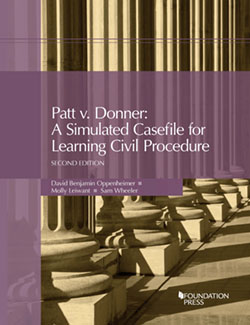- Home
- Patt v. Donner: A Simulated Casefile for Learning Civil Procedure
Patt v. Donner: A Simulated Casefile for Learning Civil Procedure
Contextualizing Civil Procedure
It’s the Civil Procedure Professors’ classic lament – litigators who are former students are always telling us that NOW they see why civil procedure is so important, and that NOW they understand it. Our challenge is to make the course accessible to our students while they are enrolled, not just after they start practicing. The Patt v. Donner case file is intended to do just that – to help civil procedure students put the course in context as they study, by requiring them to follow, and help draft the pleadings, as a simulated case unfolds from the first day of the semester to the last.
On day 1 students watch a ten-minute You Tube™ video of an initial client interview. Paula Patt, a newly arrived graduate student at UC Berkeley has been denied an apartment; she suspects it’s because she’s a single mother. Over the course of the semester students participate in drafting her complaint and seeking a TRO; switch sides to help complete motions to dismiss for failure to state a claim, lack of personal jurisdiction, and lack of subject matter jurisdiction; switch back to amend the complaint and move for discovery sanctions; oppose a motion to intervene, then move for—or oppose—summary judgment, and conclude the term with a settlement negotiation. Each pleading exercise provides the student with a largely completed pleading; all they need to do is draft a few key paragraphs. (We call this the 90% solution.)
The exercises can be completed as homework or in class, as solo assignments or in teams, and with feedback from the instructor, teaching assistants, or through peer review.
The instructors’ edition contains teaching notes, a ready to distribute Word version of each exercise, four videos (client interviews and depositions) and a completed example of each pleading exercise, ready for distribution.
For more information and additional teaching materials, visit the companion site.
Imprint: Foundation Press
Series: Coursebook
Publication Date: 03/27/2019
Related Subject(s): Professional Identity Formation
David Benjamin Oppenheimer, University of CA-Berkeley School of Law
Molly Leiwant
Sam Wheeler
CasebookPlus™
This title is available in our CasebookPlus format. CasebookPlus provides support beyond your classroom lectures and materials by offering additional digital resources to you and your students. Anchored by faculty-authored formative self-assessments keyed to our most popular casebooks, CasebookPlus allows students to test their understanding of core concepts as they are learning them in class – on their own, outside of the classroom, with no extra work on your part. CasebookPlus combines three important elements:
- A new print or digital casebook
- Access to a downloadable eBook with the ability to highlight and add notes
- 12-month access to a digital Learning Library complete with:
- Chapter questions keyed to the casebook
- Black Letter Law questions (available in select subjects)
- Subject area review questions for end of semester use
Leading digital study aids, an outline starter, and audio lectures in select subjects
Students can still utilize CasebookPlus digital resources if they’ve purchased a used book or are renting their text by purchasing the Learning Library at westacademic.com.
With CasebookPlus, you can customize your students’ learning experience and monitor their performance. The quiz editor allows you to create your own custom quiz set, suppress specific quiz questions or quiz sets, and time-release quiz questions. Additionally, the flexible, customized reporting capability helps you evaluate your students’ understanding of the material and can also help your school demonstrate compliance with the new ABA Assessment and Learning Outcomes standards.
Learn more about this series.
Access Denied
Law School Faculty - Sign in or Create an Account to access this content. Law faculty who have created an account can sign in after receiving email notification that registration has been approved. Email accountmanager@westacademic.com or call 800-313-9378 for assistance.
Other Higher Education Faculty who wish to access digital review copies or teaching resources should contact their West Academic Account Manager at college@westacademic.com or 800-360-9378.
Adopters Only
This content is intended for adopters only. Sign in or Create an Account to access this content. Law faculty who have created an account can sign in after receiving email notification that registration has been approved. If you are an adopter who is unable to access this content after signing in, contact your account manager for assistance at accountmanager@westacademic.com or call 800-313-9378 for assistance.
Access Denied
Sign in or Create an Account to access this content. Faculty who have created an account can sign in after receiving email notification that registration has been approved. Contact us for assistance.
Law School Faculty: email accountmanager@westacademic.com or call 800-313-9378.
Other Higher Education Faculty: email college@westacademic.com or 800-360-9378.
Access Denied
Higher education faculty who wish to view this document should contact their West Academic Account Manager at college@westacademic.com or 800-360-9378.
